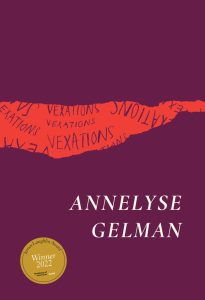Read an Interview with Annelyse Gelman, author of “Vexations”
As we enter the relaunch of the Phoenix Poets series, we’re introducing the new editors and poets through a series of short interviews. Here, we spoke with Annelyse Gelman, whose new book, Vexations, has been awarded the James Laughlin Award from the Academy of American Poets. Annelyse dives into the contradictions at play in poetry, the inspiration behind her book’s title, and the tension between the public and the private in her process.

Tell us a little about yourself and your relationship to poetry.
I love poetry, but my relationship with it is pretty contentious. It’s a medium that promises immediacy and interiority, but demands sustained attention; it promises intimacy but alienates many of its readers. Poetry can be written anywhere, by anyone, for essentially no cost, and a poem is infinitely reproducible—a lot of them can even be carried around by a single person forever, memorized and contemplated and recited and revisited—and, even more miraculously, a poem can express literally anything by simply rearranging the alphabet. And yet in the larger scheme of things, the poems I really connect with, the ones I carry with me, are so few! Compared with popular culture—music, sports, films—contemporary poetry has largely been relegated to the hinterlands, which gives it some immunity from contamination by market forces—but social divisiveness, splintering into aesthetic schools, and various forms of exclusion are still rampant . . . and in a cultural environment that still disparages DIY movements and self-publishing, sharing our work can still feel like a zero-sum game, especially when opportunities to really immerse in the practice of poetry are disproportionately allocated to the wealthy. So there are a lot of contradictions at play, both in the craft itself and in the social structures we’ve built around it (often in collusion with capitalism). As a community member, I try to wedge the doors open as wide as possible; as a poet, I try to keep my mind open, to be guided by my attentions and obsessions, and to embrace whatever influences speak to me. Vexations isn’t autobiographical, but it’s definitely guided by my experiences. For example, it’s inspired in part by the years I spent hanging around the poetry slam scene in Berkeley, California as a teenager, where the mic—and the judges’ table—was open to literally anyone who walked through the door; it also comes, in part, from exposure to fairly obscure music, like a 24-hour-concert of Erik Satie’s piano piece “Vexations” (whence the title is thieved), or the experimental echtzeitmusik scene in Berlin, where musician-composers often performed on bizarre instruments they built themselves (contact mics, repurposed refuse, Max patches), or performed in bizarre ways with conventional instruments (extended technique, prepared pianos, et al).
What’s something you’re particularly excited about with your new book? (Are you working in any experimental forms, does it depart from your previous work, etc?)
My last book, Everyone I Love Is a Stranger to Someone, came out almost a decade ago when I was fresh out of college. Vexations is different in pretty much every conceivable way, except that I’m still the same person, with the same goal of giving my readers an experience that will (hopefully!) be moving, thought-provoking, funny, heartbreaking, strange, etc., often all at once. Erik Satie’s “Vexations” is a solo piano piece. The score fits on one page, but it’s annotated with an instruction to the performer to play it 840 times in a row. That’s how I first heard it—over and over, the same piano motif, at a concert that lasted for 24 hours. I had a sleeping bag and lay on the floor, listening and not listening, eventually entering into this psychedelic mental space brought about by the tension between repetition and variation, boredom and surprise. Vexations starts with that idea and expands to include . . . well, practically the entire world. Everyone I Love Is a Stranger to Someone is a collection of poems written over a span of years, and overall it’s pretty chatty and the craft is woven into vernacular speech, like hanging out with a good friend. Vexations, on the other hand, is utterly weird. It’s one long poem. I wrote it in a frenzy over a period of months. Its voice is much more angular, prophetic, wide-ranging—and the sustained, rigid, almost agonizing structure, its refusal to evolve, is a sharp departure from my first book, which employs a variety of forms. Vexations is still playful, but it’s a very different kind of game, with much higher stakes.
What makes you excited to be a poet working today?
The poetry scene in the U.S. is becoming dramatically more diverse, more inclusive, more accessible, and more accepting. The walls between “spoken word” and “academia” are definitively crumbling; historical marginalization (especially of BIPOC and queer poets) is on everyone’s radar; and people are much more willing to encounter unfamiliar work on its own terms and recognize its merits without trying to force it to conform to some predetermined notion of what poetry is or should be. This is all really exciting! And speaking more broadly—poets working today have never had more or better access to art of all kinds. We have infinite libraries at our fingertips. We have the opportunity to really make poetry whatever we want it to be, to assert our collective humanity and address the zeitgeist while carrying the torch for this artform that’s existed for thousands and thousands of years.
Do you consider your writing process to be primarily solitary or collaborative?
As a physical activity that I do with my body, writing is solitary. I sit somewhere by myself and write, and I guard this privacy jealously, to the extent that I won’t work if it’s even possible for someone to see what I’m doing. That said, the “activity” of writing is a pretty small of my process—not to downplay its significance, but I don’t spend that much time actually putting words to paper (or screen), all things considered. Much more central is poetry as a psychological or spiritual activity—a way of moving in the world that invites a particular kind of attention, flexibility, and care. (This tension between public and private is one of the most fascinating aspects of poetry to me—it’s why I started Midst, which is a journal entirely devoted to showing readers how poets actually write poems.) I’m usually looking outward, not inward—and when you look outward, that’s an inherently collaborative activity; you’re letting yourself be touched and moved and changed. Poetry keeps me on my toes and makes me appreciate the world, other people, everything I encounter, profound and trivial. It demands vulnerability, and humility, and an indefatigable attitude that borders on greed—since I’m not devoted to any particular style, and since I’m not spending a lot of time in my “imagination,” everything is fair game to me, everything is potential material. I’m working all the time. This can be kind of exhausting, but it also makes my life immeasurably richer, and it also keeps my eyes on the prize, so to speak, preventing me from getting too caught up in whether my writing is good or whether it matters, or whether it will be successful. I show up. I commit. I’m here for it. That’s it, that’s everything.
Vexations is available now from our website or your favorite bookseller.
